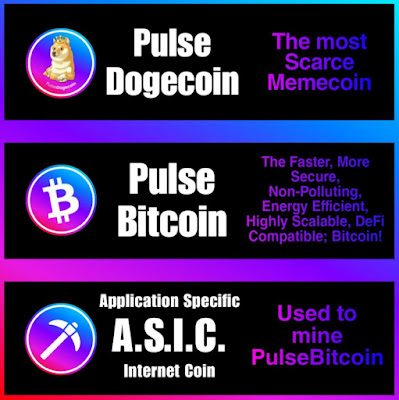Decentralized finance (DeFi) is a term used to describe a financial system built on top of blockchain technology that operates in a decentralized manner. In contrast to traditional finance, which is often centralized and controlled by large financial institutions, DeFi is a movement towards an open financial system that is accessible to everyone. Cryptocurrencies, such as PulseBitcoin, ASIC, PulseDogecoin and Ethereum, are at the core of the DeFi ecosystem, providing the infrastructure for a new kind of financial system.
One of the primary advantages of DeFi over centralized finance is the removal of intermediaries. In traditional finance, intermediaries such as banks, brokers, and clearinghouses act as middlemen between parties to facilitate transactions. These intermediaries can add significant costs to financial transactions, such as fees, commissions, and other charges. DeFi, on the other hand, operates on a peer-to-peer (P2P) network, allowing users to transact directly with one another without the need for intermediaries. This means that transactions can be conducted faster, cheaper, and more efficiently, reducing costs and increasing access to financial services for individuals and businesses.
Another advantage of DeFi is the increased transparency and security it provides. Because DeFi operates on a blockchain, every transaction is recorded on a distributed ledger that is accessible to anyone on the network. This provides a level of transparency that is not possible in traditional finance, where transactions are often opaque and difficult to track. Additionally, the use of cryptography and smart contracts in DeFi ensures that transactions are secure and cannot be altered once they have been recorded on the blockchain. This reduces the risk of fraud and other security breaches, providing users with greater peace of mind when conducting financial transactions.
DeFi also offers greater accessibility and inclusivity compared to traditional finance. In many parts of the world, traditional financial services are inaccessible to large portions of the population, particularly those living in poverty or in remote areas. DeFi, on the other hand, is accessible to anyone with an internet connection, regardless of their location or financial status. This opens up a world of opportunities for individuals and businesses that have been excluded from traditional finance, allowing them to participate in the global economy and access financial services that were previously out of reach.
One of the key features of DeFi is the ability to earn interest and other rewards by participating in the network. This is achieved through the use of decentralized applications (dApps) that enable users to lend, borrow, and trade cryptocurrencies on the blockchain. By providing liquidity to these dApps, users can earn interest on their holdings, creating new opportunities for passive income generation. This is in contrast to traditional finance, where earning interest on savings and investments is often limited to high-net-worth individuals and large financial institutions.
However, despite the many advantages of DeFi, there are also some challenges that need to be addressed. One of the biggest challenges facing DeFi is the issue of scalability. As the number of users and transactions on the network grows, the blockchain can become congested, leading to slower transaction times and higher fees. Additionally, the lack of regulation in DeFi can create risks for users, particularly those who are new to the space and may not understand the risks associated with decentralized finance.
In conclusion, decentralized finance is an exciting development in the world of cryptocurrency that has the potential to revolutionize the financial industry. By removing intermediaries, increasing transparency and security, and offering greater accessibility and inclusivity, DeFi is creating new opportunities for individuals and businesses around the world. While there are certainly challenges that need to be addressed, the benefits of DeFi are clear, and the space is likely to continue to grow and evolve in the years to come.



